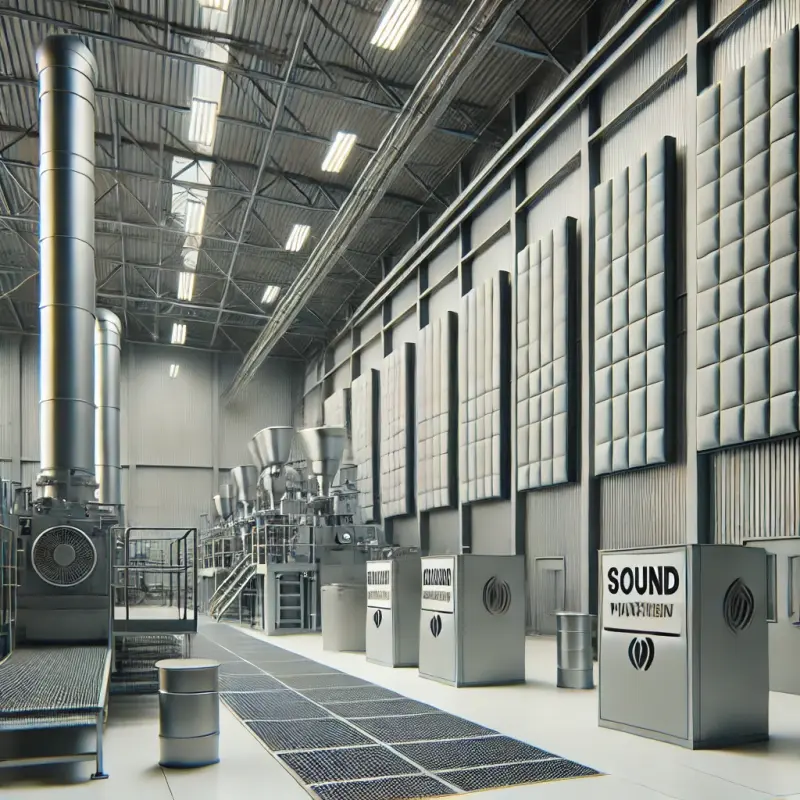Eco-Friendly Noise Control Systems in Industrial Workplaces: How Devices Create Comfortable Working Conditions
Modern industrial facilities often have high noise levels, which can affect employee well-being, reduce concentration, and impair communication. Controlling noise in such environments is crucial, and it has led to the development of eco-friendly noise control systems. These systems aim to create more comfortable and sustainable working conditions while aligning with environmental regulations and corporate social responsibility goals.

Understanding Industrial Noise Challenges
Noise pollution in industrial settings arises from machinery, equipment vibrations, and operational processes. Excessive sound levels can lead to various challenges, including:
- Employee Discomfort and Stress: Constant exposure to loud noise can cause physical and mental fatigue among workers, affecting their job performance.
- Communication Barriers: High noise levels can hinder effective communication, leading to potential safety hazards and inefficiencies.
- Regulatory Compliance: Governments and health organizations have strict regulations to minimize workplace noise exposure, making compliance essential for all facilities.
Eco-Friendly Noise Control Solutions
Sustainable noise control solutions focus on minimizing energy use and employing environmentally friendly materials. These systems include a variety of technologies and designs aimed at reducing industrial noise without harming the planet.
1. Acoustic Panels and Barriers
Acoustic panels are a common solution for reducing noise pollution. These panels are made from sound-absorbing materials that dampen sound waves, minimizing echo and reverberation. Modern acoustic panels are often constructed using recycled materials or eco-friendly composites, making them a sustainable option.
- Application: Panels can be installed on walls, ceilings, or suspended from the roof to absorb noise. Customized designs can be tailored to specific factory layouts.
- Material Innovations: Manufacturers are now creating acoustic panels from sustainable resources such as recycled polyester and organic fibers, which help reduce the carbon footprint.
2. Soundproof Enclosures
Industrial machinery often generates significant noise levels. Soundproof enclosures are used to contain this noise at its source. These enclosures are built around equipment like compressors, generators, and heavy machinery.
- Design Features: Eco-friendly soundproof enclosures use materials that are recyclable or biodegradable. Ventilation systems integrated into these enclosures also optimize energy efficiency, ensuring that machines operate without overheating.
- Customization: Depending on the size and nature of the equipment, enclosures can be tailored to provide maximum sound reduction while considering operational and maintenance needs.
3. Vibration Isolation and Dampening Systems
Noise isn't always a direct result of machinery operation; it can also come from vibrations traveling through floors and walls. Vibration isolation systems work by reducing the transfer of these vibrations, thus minimizing noise.
- Techniques Used: This includes installing anti-vibration pads, mounts, or floating floors. These systems often use recycled rubber or other sustainable materials for isolation, ensuring environmental responsibility.
- Benefits: Reducing vibration not only decreases noise levels but also prolongs the lifespan of equipment and reduces maintenance costs.
How These Systems Enhance Working Conditions
Eco-friendly noise control systems have several advantages beyond noise reduction:
- Improved Worker Health and Safety: By lowering noise levels, these systems contribute to a healthier work environment, reducing the risk of hearing loss and stress-related conditions.
- Enhanced Productivity: Comfortable noise levels enable employees to focus better and communicate more effectively, boosting overall productivity.
- Sustainability and Compliance: Companies that invest in sustainable noise control solutions demonstrate a commitment to environmental responsibility, which can enhance their corporate image and ensure compliance with regulations.
Integrating Smart Noise Monitoring Systems
An emerging advancement in noise control is the use of smart noise monitoring systems. These devices use sensors and data analytics to continuously measure and report noise levels in real time. By integrating these systems into a facility, managers can identify noise hotspots and make informed decisions about additional noise reduction strategies.
- Automation Benefits: Smart systems can automatically adjust soundproofing measures, such as dynamic acoustic panels, to optimize performance while conserving energy. This adds an adaptive and proactive element to industrial noise management.
Conclusion
Eco-friendly noise control systems are essential for creating comfortable and efficient industrial workplaces. By leveraging innovative materials and technologies, these systems not only reduce noise pollution but also align with sustainable practices. As companies become more aware of the impact of their operations on both people and the planet, the adoption of such solutions is likely to increase, benefiting everyone involved.
Articles
Sign up for our alerts to get the most recent and engaging articles delivered straight to your email.